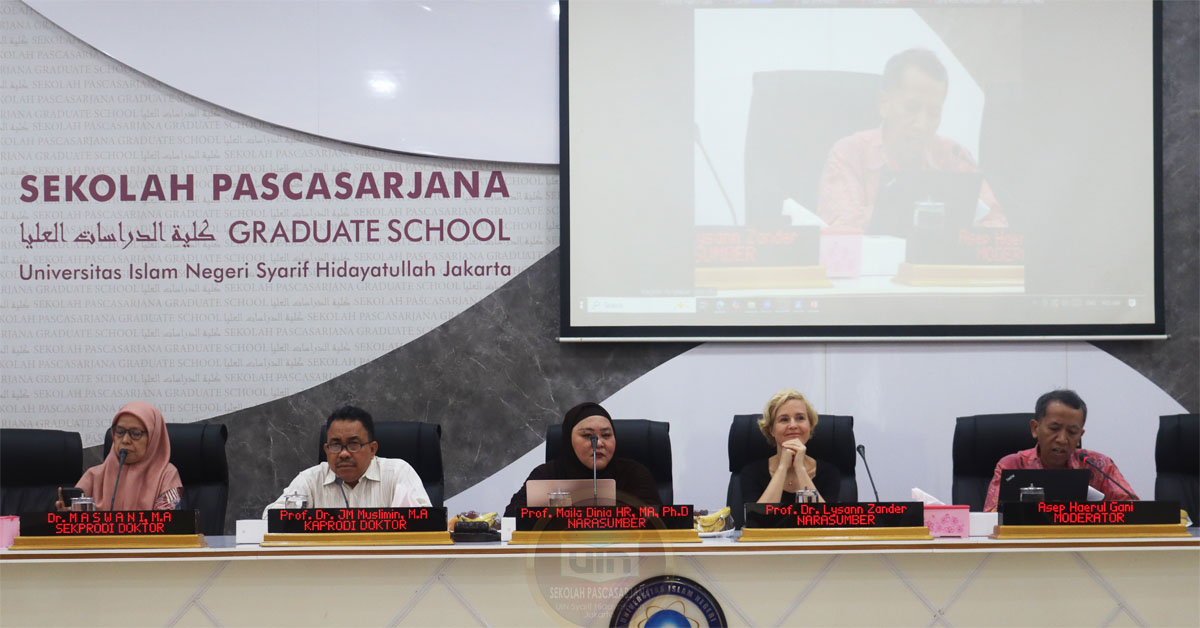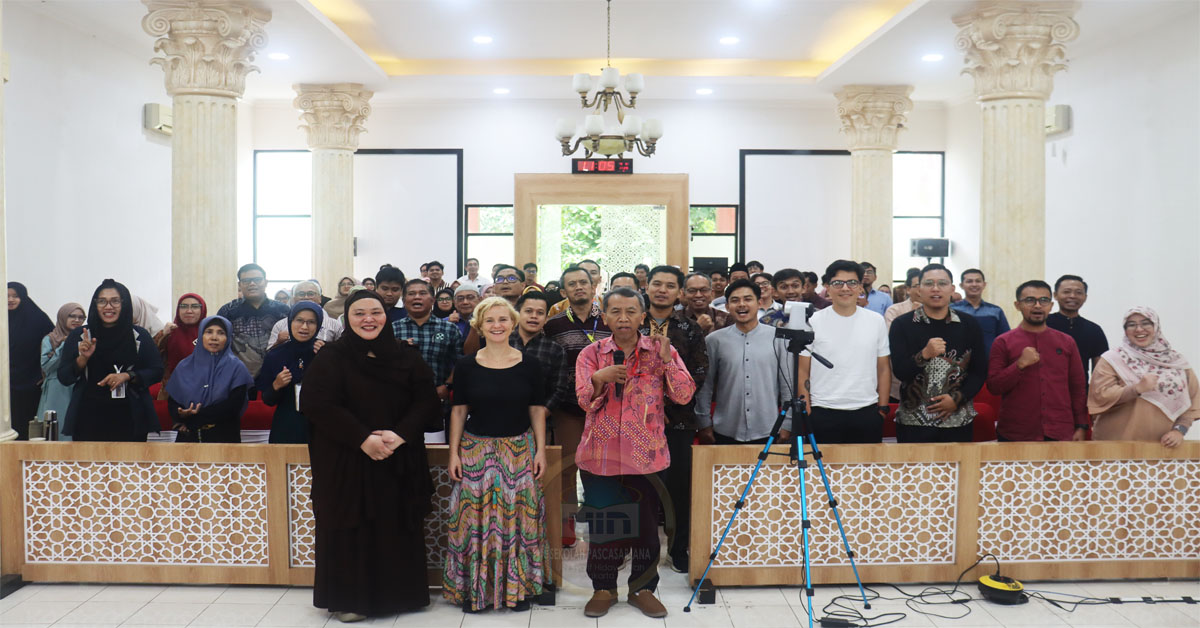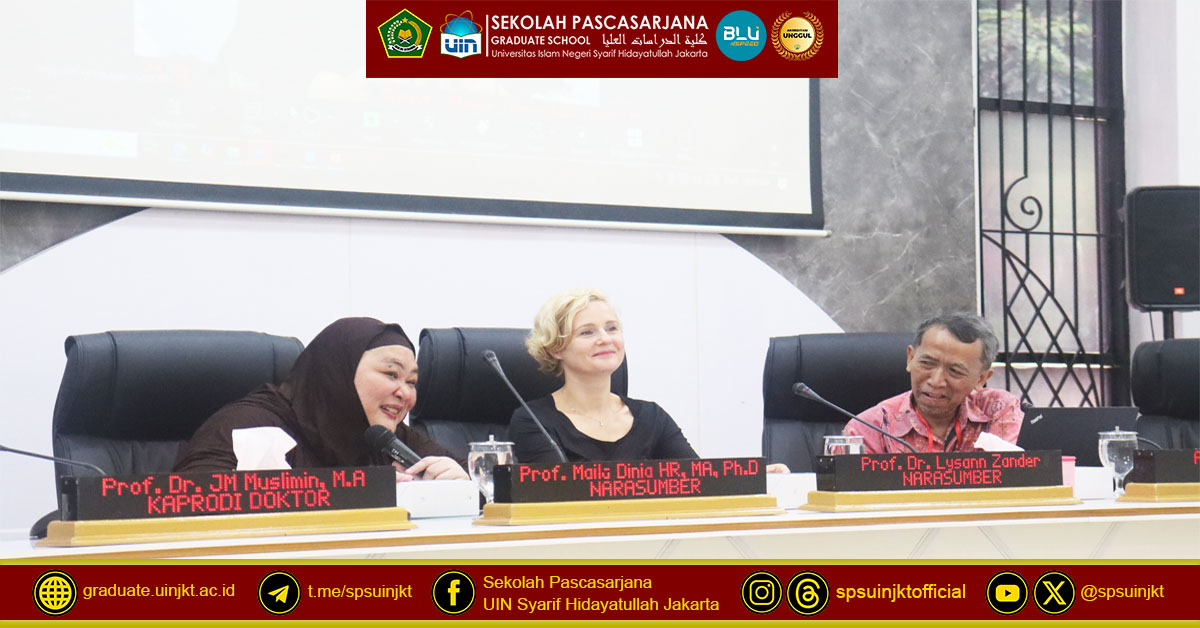Seminar for Graduate Students, Friendship Networks Key to Academic Success, Not Just Intelligence
Auditorium of Prof. Dr. Suwito, MA SPs UIN Jakarta, SPs NEWS - The Graduate School (SPs) of UIN Syarif Hidayatullah Jakarta held a Seminar for Graduate Students which was held on Wednesday, October 15, 2025 at the Auditorium of Prof. Dr. Suwito, MA, with speakers Prof. Dr. Lysann Zander (Leibniz University Hannover, Germany) and Prof. Maila Dinia Husni Rahiem, MA, Ph.D (UIN Syarif HIdayatullah Jakarta. The seminar highlighted that a network of friends is the key to academic success, not just individual intelligence.
This seminar activity is clear evidence of the commitment of the leadership of SPs UIN Jakarta in improving the competence of both masters and doctoral students. The event was opened by the Head of the Doctoral Study Program in Islamic Studies, Prof. Dr. JM. Muslimin, MA, in his speech expressed his appreciation for the presence of two speakers, hoping that the knowledge conveyed would bring real benefits to all participants.
Prof. Dr. Lysann Zander from Leibniz University Hannover, Germany, presented the results of his research entitled "The Power of We: From Doubt to Development." Her research emphatically highlights the important role of belonging and peer communication in supporting academic success.
Prof. Zander explained that students, especially those who are just starting their studies, often face self-doubt. However, his research found that this problem can be effectively addressed by actively seeking and receiving support from peers. A strong network of friends proves to be not just emotional support, but a vital foundation for optimal academic achievement.

The key to effectiveness in this network, according to Prof. Zander, lies in the way students ask for help. He recommends an instrumental help-seeking strategy, which is to ask questions that focus on understanding the process or strategy, rather than simply asking for answers. This approach has been shown to predict deeper learning and better academic outcomes.
In addition, it is important to build a network based on reciprocity, a condition in which students feel comfortable asking for and at the same time offering help. This reciprocal mechanism not only strengthens support networks, but also intrinsically increases their sense of belonging within the academic community.
Prof. Zander added that peer relationships also enrich the learning experience through social dialogue, creating a low-risk space where mistakes are not punished, but rather transformed into "negative knowledge" for improvement. Such an environment facilitates honest and constructive feedback, which is considered an investment and a reflection of trust in the relationship.
Meanwhile, Prof. Maila, gave a strong presentation on the importance of international collaboration to raise the reputation of Indonesian academics in the eyes of the world. In his presentation, "Visible, Valuable, Connected: Indonesian Scholarship in the Global Arena," he presented optimistic data on increasing global recognition.
Prof. Maila revealed that there is a significant positive trend in the Indonesian academic world. The number of Indonesian scientists included in the Stanford/Elsevier list of the world's top 2% of scientists has more than doubled, from 98 scientists in 2022 to 209 in 2025. This increase underscores that Indonesia is starting to gain a greater place and recognition on the international academic stage.

As a clear illustration of the benefits of cross-cultural cooperation, Prof. Maila presented her collaboration with Prof. Dr. Lysann Zander from Leibniz University Hannover, Germany. The partnership focuses on comparative analysis of surveys on student well-being and motivation amid the COVID-19 pandemic, and has resulted in publications and opened up opportunities for other sustainable projects.
Furthermore, he specifically encouraged postgraduate students, especially from State Islamic Religious Universities (PTKIN), to be proactively involved in collaborative and cross-cultural research projects. Prof. Maila also highlighted the need to increase the number of Indonesian women scientists who are consistently in the Top 2%, emphasizing that international collaboration is key to strengthening the careers and image of institutions.
The seminar moderated by Asep Haerul Gani (Doctoral Student of SPs UIN Jakarta) took place very interactively, as seen from the enthusiasm and lively discussion of the participants. Academic progress is a combination of individual skill development and strong community building. Therefore, every graduate student has an active role to support each other and, ultimately, truly feel an integral part of their learning environment. (JA)

